Responses
Susan Corrigall (Copyright Officer at the National Records of Scotland) – hereinafter (SC)
Ronan Deazley (Professor of Copyright Law, University of Glasgow) – hereinafter (RD)
Paul Gibbons (Information Compliance Manager, SOAS) – hereinafter (PG)
Martin Kretschmer (Director, CREATe, University of Glasgow) – hereinafter (MK)
Nick Munn (Deputy Director for Copyright) – hereinafter (NM)
Tim Padfield (International Council on Archives) – hereinafter (TP)
Ellie Robinson (Archivist, LSE) – hereinafter (ER)
Robin Stout (Policy Advisor, IPO) – hereinafter (RS)
Pam Temple (Community Archivist) – hereinafter (PT)
Anna Vernon (Licensing and Copyright Assurance Manager, British Library) – hereinafter (AV)
Cathy Williams (Head of Collections Knowledge, TNA) – hereinafter (CW)
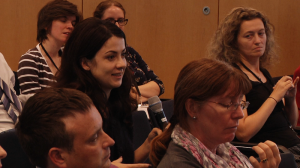 AV: Hi, I have a question for the IPO. Anna Vernon from the British Library. My reading of the Orphan Works Directive is that it includes embedded works, so how much scope do you have, given that you’ve got to implement this Directive, to change that and make it less onerous for archives and libraries to implement, and do a diligent search for each individual item?
AV: Hi, I have a question for the IPO. Anna Vernon from the British Library. My reading of the Orphan Works Directive is that it includes embedded works, so how much scope do you have, given that you’ve got to implement this Directive, to change that and make it less onerous for archives and libraries to implement, and do a diligent search for each individual item?
NM: That’s an easy one to answer, though you won’t like the answer, which is essentially none, whatsoever. European Directives are fought out rather extensively and what they say we have to do, so to the extent the requirement is in the Directive, and I’m afraid the requirement to search for embedded works is very firmly in the Directive, we have no choice other than to do that. At this stage, I don’t think there’s enough trust between rights holders and the potential users of the Orphan Works Scheme, whether the Directive or the UK’s, for there to be mutual comfort around any solutions that don’t involve clearing individual rights. That might change in the future, when people have had a chance to get used to these new schemes. They’re not the first in the world, but they are relatively new. Sorry, Anna.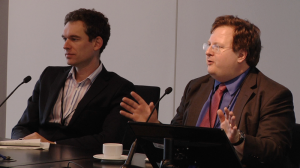
ER: Ellie Robinson from London School of Economics. I have a question about the Section 42 amendment for preservation copying. You mentioned that it would be more suited to modern preservation techniques, and I just wondered if you could clarify that a bit more?
RS: Okay, I’ll try to. I think some of this, as I said, Tim may disagree that it is suited to modern preservation techniques. There are questions around how we draft it, and we’ve put our legislation out to ask people whether it achieves what we’re trying to do. But for instance, one of the issues is that it’s not entirely clear from the language in the current provision, whether or not you can take multiple copies of a work. It seems on one reading you may only be able to take a single copy. Also, it’s drafted around replacing copies and doesn’t use the language of preservation, and it’s something that we’re working on, people have given us feedback and we’re just trying to make sure that the language in the legislation matches what goes on. If you read what’s currently there, it describes quite a restrictive process which people tell us isn’t really what they do. Does that make sense? More widely, it’ll apply to different materials, so it’ll apply to films and photos and broadcasts and all these things, so from that sense as well, it’s better tailored to modern media.
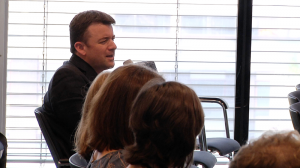 PG: Paul Gibbons, School of Oriental and African Studies. It’s a question for Robin. I just wondered about the education exception and the definition of non-commercial fair dealing. Universities increasingly are commercial, so would lectures count as non-commercial in that context or not?
PG: Paul Gibbons, School of Oriental and African Studies. It’s a question for Robin. I just wondered about the education exception and the definition of non-commercial fair dealing. Universities increasingly are commercial, so would lectures count as non-commercial in that context or not?
RS: This is the type of question where it’s dangerous for me to try to give a definitive answer. It’s fair dealing, so one part of the equation is a judgement on the fairness of the activity, and we often give the use of materials in presentations as one of our examples, the use of an interactive whiteboard in a classroom. We often use that one because it seems pretty much like fair dealing to us, although even on that you can never quite say until it’s tested. But I think that on a non-commercial side, it’s the purpose of the activity which needs to be non commercial, so it’s not with reference to the institution. In fact, the fair dealing provision doesn’t apply to particular institutions at all, so it’s all about whether you are teaching, or we use the word instruction for some reason in our legislation, but essentially it has to be teaching for a non-commercial purpose, and to the extent that it’s fair to do that. It’s not about the type of body. Whether or not the purpose is non-commercial, I think is a separate judgement and something that we can’t –
PG: That’s more what I was wondering, does it count as non-commercial because it’s what the individual is doing, but if the individual is a lecturer working for an organisation, does that make it commercial or not? Or can’t you comment?
RS: They’re similar questions, aren’t they, in relation to the research fair dealing which Nick’s involved with, and the term non-commercial comes from the copyright directive, so in respect of this one we have to have it. The Directive says you can have this type of exception, but you can’t go further than this boundary and one of the restrictions on this type is it must be non-commercial. As a legislator in an EU member state, it’s very dangerous to start writing into your law, “Non-commercial means this,” because in a few years’ time there will be a case before the European Court where the European Court says, “Non-commercial means this.” Very often where there are terms like this, we simply go with how they’re written down and people just have to place the normal meaning on those words to the extent that that is possible.
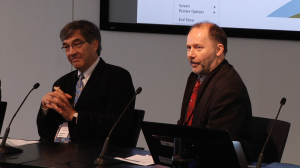 NM: If I can just add ever so slightly to that answer. The Copyright Directive from which Robin is rightly answering, does contain a recital which is basically a preamble to the law that says what it’s meant to do. That does suggest - I think it’s number 42 but I always get that wrong - that you shouldn’t be going too deep into wondering about fundamentals about does someone ultimately make a financial benefit from this, in terms of defining non-commercial. It is the activity itself, as Robin said, a non-commercial aim or a commercial aim. What you might do, for instance, in your academic institution, is photocopy the interesting bits of your Charter that say what your institution is there for if anyone starts asking questions about the commercial-ness or otherwise of your activity. But ultimately Robin is being cagey, not because he wishes to be unhelpful, but because it’s a question of fact which ultimately would be up to the courts. Although that’s a horrible answer to have to give, I’m afraid the whole of copyright ultimately comes down to the interpretation of something which, as Robin says, is a trifle complicated, both to read and also to apply.
NM: If I can just add ever so slightly to that answer. The Copyright Directive from which Robin is rightly answering, does contain a recital which is basically a preamble to the law that says what it’s meant to do. That does suggest - I think it’s number 42 but I always get that wrong - that you shouldn’t be going too deep into wondering about fundamentals about does someone ultimately make a financial benefit from this, in terms of defining non-commercial. It is the activity itself, as Robin said, a non-commercial aim or a commercial aim. What you might do, for instance, in your academic institution, is photocopy the interesting bits of your Charter that say what your institution is there for if anyone starts asking questions about the commercial-ness or otherwise of your activity. But ultimately Robin is being cagey, not because he wishes to be unhelpful, but because it’s a question of fact which ultimately would be up to the courts. Although that’s a horrible answer to have to give, I’m afraid the whole of copyright ultimately comes down to the interpretation of something which, as Robin says, is a trifle complicated, both to read and also to apply.
MK: Tim, would you like to comment on any of the issues that came up, just because the questions came the IPO’s way? Is there still a question in the room? There’s still two.
CW: Cathy Williams, National Archives. Just to pick up, Robin you joked about the definition of archives, but how are you going to define the collecting institutions to whom these exceptions etc apply? Especially, since through the current legislation and what you’re proposing, you scatter terms like library, archive, museum, creator, and associate them with different exceptions, where actually, aren’t we talking about the nature of a collection, how it’s been formed and how it’s going to be used, rather than the institution?
RS: In terms of the types of institution that we’re referring to, again the Copyright Directive sets some limits. It says that libraries, archives, museums and educational establishments are the type that we can apply certain exceptions to, and in this area we’re trying to, in some ways, use the maximum scope that those provisions provide for us. That’s why we’re extending the types of organisation it applies to. In terms of the organisation, an archive, as I said, is already defined as an archive in the law and you just have to apply the normal meaning of that word. In many areas, part of the problem with the current copyright legislation is that it bends over backwards to try to define every last eventuality, and minutely define every last definition, and sometimes that ends up not being helpful. People constantly say, “Can you define this further, can you define that further?” The law ought to just make sense. You give words their normal meaning, the courts will give it their normal meaning, and hopefully we don’t have to try to tell people what these things are.
NM: I think that’s right. Your choices here are, you can either try to persuade someone that you’re really an archive, or you can have parliament decide whether you’re an archive or not. I think you have a better chance of defending your own existence as an archive, and the best way of doing that is to leave ‘archive’ to have its natural meaning, and to let you justify your activities as well. “We’re an archive, we do archive-y things, this is what an archive is, this is what we do, look, we fit.” As opposed to leaving it up to people like Robin and me, to try and write down from our understanding of archives, yes we’ll talk to you about it, a formulation which may not in 20 years reflect what archives are like. We think you’re better off with this approach, frankly, but if you disagree you’d better tell us.
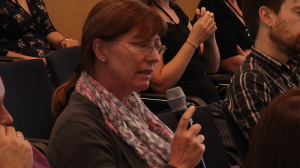 PT: My name’s Pam Temple. I’m from UCL, but I also represent a community archive. My question is quite simple. Can you say when the flexibility around 2039 restrictions on unpublished works is going to be lifted; can you give us a timeframe for that?
PT: My name’s Pam Temple. I’m from UCL, but I also represent a community archive. My question is quite simple. Can you say when the flexibility around 2039 restrictions on unpublished works is going to be lifted; can you give us a timeframe for that?
NM: What do you think? The honest answer is, no, I can’t give you a date right now but I don’t see any particular reason why we would hang about doing it, so watch this space. We’re not thinking this is going to be a 5 year project. I would hope, but don’t hold me to this please, next 12 months. If you leave me a card or some details, I’ll get back to you with any sort of update.
PT: Thank you.
SC: Susan Corrigall, National Records of Scotland. I have a quick question about the Orphan Works Licencing Scheme. Do you have any idea yet of the composition of the panel who will define the bounds of a diligent search?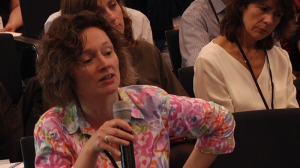
NM: One, I’m not sure we would use a panel as such. Two, partly as a result of the discussion we had this morning, I’m not sure that defining the bounds is quite how we’re going to want to do that. The sense that there is no one rigid rule for, “It is a diligent search if you do it this way, and it is not a diligent search if you do it that way,” would mean that we want to leave some of those boundaries to sense and judgement, and to pick up a word that Robin used several times, fairness. The basic rules for the Orphan Works Scheme will be consulted on in the next little while, so I’d hope, but again don’t hold me to this, it just depends on what ministers really want to do, I might hope that you’d have a chance to see that before Christmas at the very latest. So firstly, everyone gets a voice, and it’s not just going to be some panel that’s making this up. Secondly, if there’s anyone who thinks they have a burning amount to contribute on what diligent search looks like, or doesn’t look like, and we’re quite keen not to over-engineer as well as make sure it’s adequate, so what’s a minimum standard of diligence, rather than what is everything you could possibly think of to do, then I’m happy to take people’s details as someone who thinks they might have something to add. We might be coming round to ask, “How does it work for you, what does it look like, who knows about this, who can we ask?” We are very keen to get that working right when the scheme is introduced, and not in the light of bitter experience of no one using it, because they don’t think it’ll work.
MK: Will you be here for the final plenary, will people have a chance to catch you again?
NM: I’m afraid I’m going to have to shoot off, but I will certainly be here for the coffee break, or what remains of it. I’m very happy to take immediate questions now, otherwise you can contact us, usual government email addresses, via panel members or Googling will probably work.
MK: It’s exemplary that the IPO is willing to engage with us in this way. They’re not always easy conversations, but as you earlier said, generally we are quite friendly, apart from myself. Ronan, shall we close?
RD: Yes, I think so. There’s two different timelines. You’ve got one timeline on the back of your card and a different timeline up here and we’ve exactly split the difference between the two. If we wind up here, and restart at quarter to three for the final panel, and then we’ll go on to the plenary.
MK: Thank you.
To leave feedback on the discussion within this Q&A session, click here.
